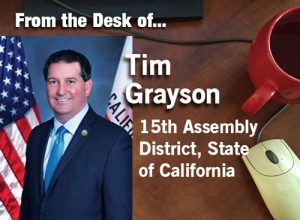AB 2017 will help to rein in junk fees
 (August 29, 2024) — As Chair of the Assembly Banking and Finance Committee, I’ve worked to take on predatory lenders and unfair banking practices, and help reform our financial systems to better serve hardworking Californians.
(August 29, 2024) — As Chair of the Assembly Banking and Finance Committee, I’ve worked to take on predatory lenders and unfair banking practices, and help reform our financial systems to better serve hardworking Californians.
Over the last decade, the banking industry has been rife with “fee creep,” the gradual and growing use of questionable fees often charged to those consumers who least can afford them.
These “junk fees” are often disproportionate to the actual cost of providing a service to a consumer, and banks and other financial institutions have increasingly relied on them to increase their profits.
This year, I am authoring legislation to rein in a particular type of junk fee known as nonsufficient fund (NSF) fees.
NSF fees
My bill, AB 2017, will prohibit a bank or credit union from charging consumers an NSF fee when they attempt to make a purchase – and it’s declined immediately by the bank or credit union due to nonsufficient funds. Said another way, banks should not be charging consumers fees for transactions that are declined right away, and my bill will put a stop to this practice.
Currently, when a consumer’s attempted withdrawal or transaction amount exceeds the available funds in their account, a bank or credit union may decline the transaction and charge the consumer an NSF fee.
An NSF fee is separate and distinct from an overdraft fee, which is a fee charged by a bank or credit union when they allow a purchase to go through, even if the account does not have enough money in it. Though they are different, NSF fees and overdraft fees are often discussed together when we discuss the ways financial institutions have become over-reliant on junk fees.
Today, the combined costs of overdraft and NSF fees are a higher cost to consumers than the combined cost of periodic maintenance fees and ATM fees.
According to the Consumer Financial Protection Bureau (CFPB) in 2019, banks and credit unions collected an estimated $15.5 billion from their consumers through overdraft and NSF fees. These fees are most likely to be assessed on financially vulnerable consumers, such as those with lower incomes and lower credit scores.
NSF fees, which average around $30, are particularly an unfair practice because consumers receive no service at all in exchange for the fee.
Proactively setting regulations
California should lead the nation in proactively setting regulations to protect consumers from abusive practices. By prohibiting a financial institution from charging a consumer an NSF fee when the consumer’s attempt to initiate a transaction is declined right away due to nonsufficient funds, AB 2017 will rein in junk fees and protect financially vulnerable consumers from charges that they cannot afford.
To learn more about legislation related to junk fees being considered by the Legislature this year, or to discuss other matters important to you, please connect with me through my Concord District Office at (925) 521-1511. As always, it is an honor to serve you and our community.
